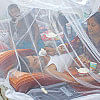A record we did not want

Despite many reassurances from the authorities concerned, there is no sign of the dengue outbreak letting up in Bangladesh. Since April, the numbers of dengue cases and deaths have been rising consistently, overwhelming our healthcare system to a great extent. So it doesn't come as a surprise to us that the World Health Organization (WHO) has termed the ongoing bout of the mosquito-borne viral disease in our country the "worst outbreak on record." Between January 1 and September 6 this year, a total of 138,022 cases of dengue infections and 671 deaths have been recorded across the country. For context, last year saw 281 deaths and 62,382 cases reported, and in 2019, the previously worst year for dengue in the country, 101,354 cases and 164 deaths were reported.
The WHO has listed climate change as a major factor behind the fast spreading of dengue. The UN agency sounded the alarm earlier in January as well, when it said warmer weather systems could catalyse a faster spread of the tropical disease, and it could become a "pandemic threat." Our local experts, too, raised the same alarm in May, saying that timely and effective measures would help control the spread of the disease.
But it seems all these warnings fell on deaf ears. Added to that was an overall lacklustre attitude of the relevant government agencies towards the situation. Even in July, our health minister didn't think the dengue crisis warranted declaring a nationwide public health emergency. The consequence: August 2023 proved to be deadlier than the entire year of 2022, with 71,976 cases of dengue and 342 deaths reported, according to the health directorate.
After years of dealing with dengue, and having access to notable public health and climate experts in the country, the relevant government agencies should have been able to figure out the best course of action to tackle dengue – or better yet, how to prevent it from becoming a public health crisis in the first place. Other countries have been able to control dengue. Did it not occur to our government officials to refer to best practices from those countries? Instead, they floundered with reactive actions to tackle the disaster, and we suffered needless deaths.
This state of affairs is unacceptable. The relevant ministries of the government must answer for their lack of planning and farsightedness and immediately figure out how to take control of the situation. Most importantly, the top brass of the government must do a rigorous assessment of those in charge of public health and disease control, and replace them with more competent people who can make timely and effective decisions and prevent needless public health crises.
Follow The Daily Star Opinion on Facebook for the latest opinions, commentaries and analyses by experts and professionals. To contribute your article or letter to The Daily Star Opinion, see our guidelines for submission.


 For all latest news, follow The Daily Star's Google News channel.
For all latest news, follow The Daily Star's Google News channel. 









Comments